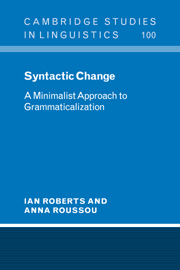4 - D elements
Published online by Cambridge University Press: 22 September 2009
Summary
Introduction
In this chapter we turn our attention to the third type of functional category: D elements. We proceed much as in the previous two chapters, in that we will examine certain well-known cases of grammaticalization, in particular the development of definite determiners out of demonstratives (section 4.1), the development of n-words (sections 4.2), the development of wh-words out of indefinites (sections 4.3) and of universal quantifiers (sections 4.4). We show that several of these cases involve loss of movement inside the DP, and the formation (or loss of) an Agree relation with another head in the clause structure. In so far as they involve loss of movement, these examples of grammaticalization are therefore the D system counterpart of the development of auxiliaries in the T system, as discussed in Chapter 2. In sections 4.5 and 4.6 we discuss the development of pronouns as agreement markers (clitics and affixes), further showing how features typically associated with the DP become associated with functional heads in the clausal domain. In some respects this reanalysis is similar to the development of complementizers as discussed in Chapter 3.
In general, then, the grammaticalization of D elements offers examples of loss of movement combined with loss of morphology of a type familiar from our study of T elements in Chapter 2, the reanalysis of heads due to structural reanalysis and simplification, similar to what we saw in Chapter 3, and a new phenomenon: the addition of a formal feature to a head.
- Type
- Chapter
- Information
- Syntactic ChangeA Minimalist Approach to Grammaticalization, pp. 131 - 193Publisher: Cambridge University PressPrint publication year: 2003



